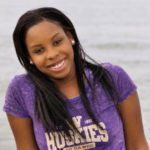Student Voice: Just as the First Lady Said, “When They Go Low, We Go High”
By MyKaila Young, LEV Intern
 There isn’t a law that forbids any one of us from understanding how capable we are or how capable we are allowed to be. A few posts back, I mentioned my friend Deonte Bridges and how he was, in a figurative sense, the “Guru of Virtues.” The other day, he posted something online that I feel we should all understand. He wrote, “The system is run by two things in my opinion: Fear and Dependency. Until you give those up, you will find yourself mentally and physically controlled by things and faces that you have never seen.”
There isn’t a law that forbids any one of us from understanding how capable we are or how capable we are allowed to be. A few posts back, I mentioned my friend Deonte Bridges and how he was, in a figurative sense, the “Guru of Virtues.” The other day, he posted something online that I feel we should all understand. He wrote, “The system is run by two things in my opinion: Fear and Dependency. Until you give those up, you will find yourself mentally and physically controlled by things and faces that you have never seen.”
I learned a very long time ago, mainly through my stepdad’s harsh but necessary teachings, that you cannot depend on the system entirely as the sole source for your education, and you should always, if necessary, depend on something that is strong and logical. For me, I depended on actual people who made real changes in this nation through their perspectives and strength to prevail, because I figured that form of education would always be necessary. I happened to be right for once.
I believe if Malcom X or Martin Luther King were still alive, they would want us to remember that we didn’t get to where we are today by waiting for the system to change. We got to where we are today by challenging the system and taking back what was rightfully ours, and we must continue to do the same now. There is so much more power in shared knowledge and perspective than there is with restricted access to basic awareness that the broken system provides. I hope that now, more than ever, students recognize that the power is within them, but it’s up to them to embrace it.
My reaction to the election was that this is yet another time when a nation has been seized. Throughout the election, I wondered and if anyone ever thought to ask, “When was America ever great? And how could he possibly make America great again if it was never really great?” Despite what has shaken a nation over the past several days, and what will be a very different reality moving forward in the next four years, we all have to remember that this country was built on unjust ground due to an unfair system. Certain individuals took it upon themselves to decide who would be privileged and who would be burdened, without any logic or true understanding of what it takes for a person to truly be privileged, and how easy it is for a person to be burdened by intellectual poverty and be completely unaware of it.
What surprised me the most was that now, more than ever, millions of people understand a day in the life of a student who has to go to under-resourced schools, taking on ample amounts of adult challenges and anxieties, and continuously having and deal with systematic bullying and oppression as early as 9 years old due to the education system alone. It was shocking how an entire nation felt these emotions all at once. It’s not just certain people or ethnic groups who have to deal with the burden of being uncertain. Now we all do.
The system may never change, but that’s why it’s more important than ever to consider what your role is within the system, and how you can make a difference. Sure, protesting and uniting in that way does some good, but it’s time to support each other’s progressions and fundraise for our kids who will now probably have fewer resources than before. It’s time to use the unity and bond that has been created over the past several days and progress it. Sure, one person can make you feel as if you have no value or power, but the opportunities surrounding the McCleary education funding debate ask you whether that is something you will continue to believe. Will you settle for believing you are worth less than you are, because someone makes you feel that way? I hope the answer is “No,” because you can’t allow fear to carry you through a lifetime of experiences that have already been deemed to be uncertain.
What is McCleary saying to us now? Well, it’s saying that things are going to be different moving forward, but that the fight for quality, equitable education must always be at the forefront of what we continue to advocate for. Every person, regardless of background, color, age, or sexual orientation, is going to be affected in some way by this election. However, it is up to us to change the perspective for our students and help them to redefine the barriers of privilege and poverty, because nowadays you have to ask yourself, “Is there really a difference now with the current changes in the White House?” Could McCleary be saying that, despite the unfortunate event that has transpired, the one thing we still need to do is come together and figure out a way to engage and inspire our students in a unique way? I think that’s exactly what it is saying.
George Eliot once wrote, “There is no despair so absolute as that which comes with the first moments of our first great sorrow, when we have not yet known what it is to have suffered and be healed, to have despaired and have recovered hope.” Regardless of the outcome, the presence of McCleary will always serve as a reminder for every student, now more than ever, to believe the power that they hold is unique to them.
McCleary is trying to get people to realize that, although the American Dream is just an illusion, it doesn’t mean you stop dreaming and give up. Instead, change the perspective of your life and live as best as you can. Remember how this nation was built, and how hard individuals have had to fight for change and equal opportunity in all areas of life in America. Education is the foundation for all great things and, sadly, many people in power understand that. What must we do moving forward? Be optimistic. Encourage our students to believe in something greater than themselves.
There is always going to be someone or something that is going to tell you that you cannot do something or be something. But as Albert Einstein said, “Life is like riding a bike. The key is to keep moving forward.” I lived my life in fear for quite some time, not knowing whether I was going to need another unexpected surgery that I couldn’t afford, or whether I was ever going to be able to become a great writer. Now that I am a few years older, I have learned that often we don’t fear things because we are afraid; we fear things because of their presence.
No one knows what the future holds, and it’s a scary reality. I’m sure we all dream of an equitable and prosperous educational system that empowers every student but, truth be told, why are we depending on a broken system to empower the fresh and priceless minds of our kids that is supported by a divided nation? How can we as advocates, parents, and teachers help our kids perfect and realize their power and skills? I have an idea, but it’s going to require some time, patience and, most importantly, hope in not the system but in each other.
Education is the art of learning and creating perspective. No one can ever take away your ability to learn, as long as you agree to never stop thinking, reading, and questioning everything. That’s how I found my way to journalism.
Read MyKaila’s fourth post, Is McCleary Paving the Way to a New American Dream?









 It is unfortunate that the first time I return to this blog a year after leaving the League of Education Voters is for the purpose of memorializing Andy Hill, though I can think of few people more worthy of praise and remembrance.
It is unfortunate that the first time I return to this blog a year after leaving the League of Education Voters is for the purpose of memorializing Andy Hill, though I can think of few people more worthy of praise and remembrance.